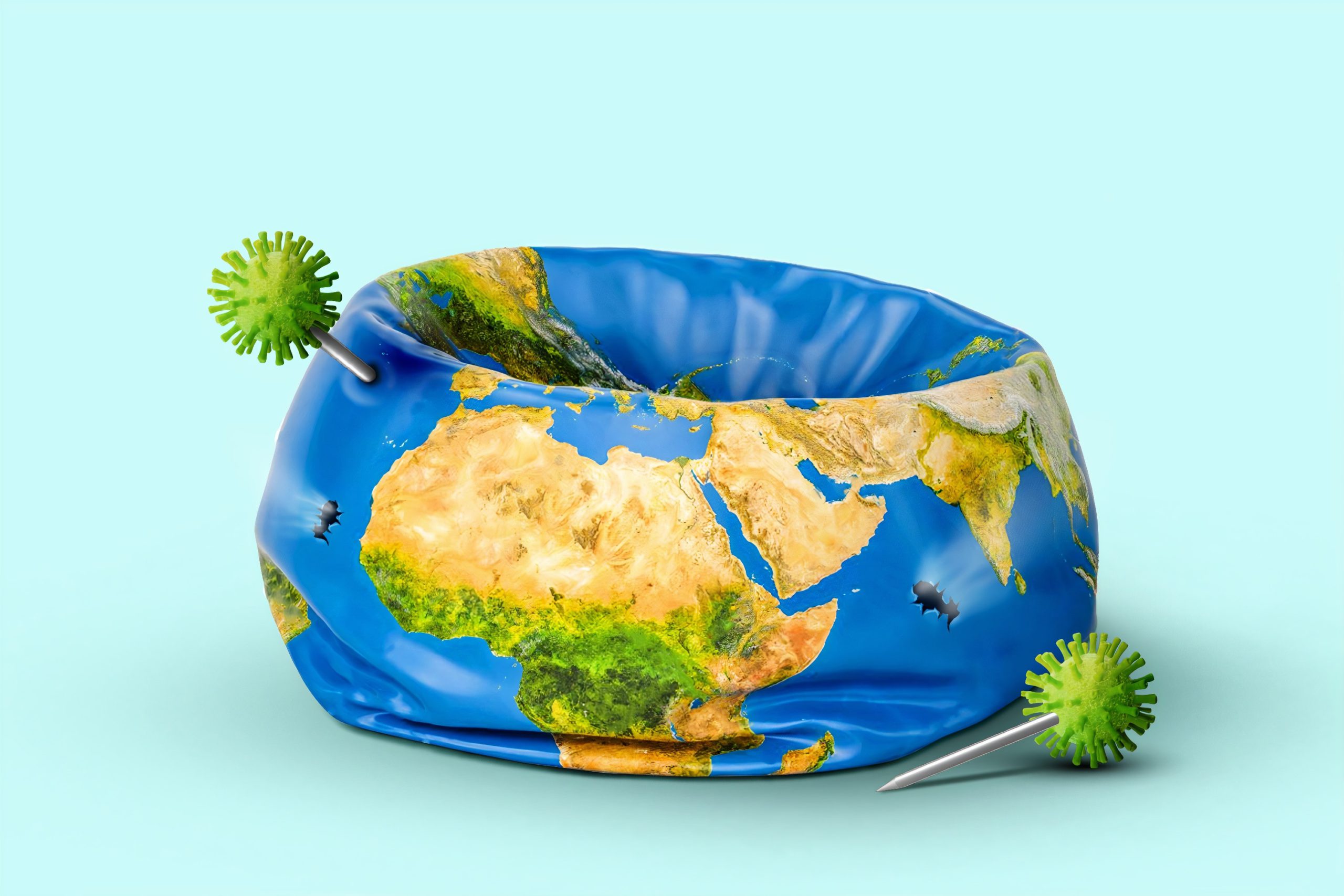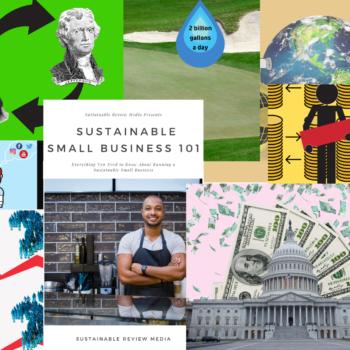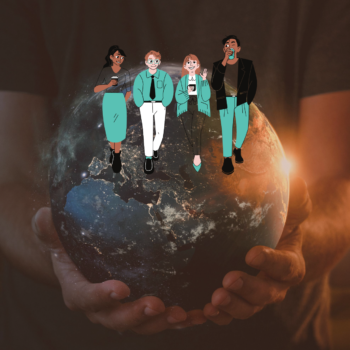The worldwide response to coronavirus demonstrates ways to facilitate rapid large-scale behavior change in the face of immediate global threat. What does this say about the power of global unity?
What can this response teach us about mobilizing a robust, cross-sector response to society’s most existential threat: climate change?
Both coronavirus and climate change remind us of our inherent vulnerability. We spend trillions of dollars on tanks and missiles to maintain global security, yet a tiny virus about one micron wide stands to kill far more individuals than just about any organized conflict other than the two world wars.
Manifestations of climate change also kill people daily, by strengthening the effect of extreme weather events and natural disasters, contributing to violent wildfires, causing flooding, destroying crop yields, and even amplifying the spread of global disease.
Let’s break down the global response to coronavirus, and evaluate why our response to climate change looks so different. There are certainly lessons to be learned from our coordinated response to COVID-19, and we must apply these real-world lessons of global unity to the climate response.
Global Unity Lesson #1
Communicate Urgency and Make it Personal
Pandemics may seem to occur on an accelerated time scale compared to climate change, partially due to the delayed warming effect of greenhouse gases in the atmosphere. However, both climate change and coronavirus require advanced planning, collaboration, and coordination of resources in order to be addressed appropriately.
In both cases, governments have failed to dedicate sufficient resources and take sufficiently drastic action, leading to unnecessary consequences, despite ample evidence regarding the gravity of the coronavirus and climate change.
Both crises constitute catastrophic failings at multiple levels- from individuals and businesses to state, local, and national governments up to international organizations.
Why have we come up so short?
It’s not your fault…entirely. Blame it on the most elusive and complicated organ — the human brain.
We evolved on the plains of Africa to process immediate short-term issues like hunger, violence, and predation. We did not evolve to process largely invisible and ominous threats like climate change and viral infections. Right now, coronavirus acts as the tiger in the jungle. The immediate threat that triggers our brains to respond.
In contrast, for many people, climate change stands as a far off risk. Let’s push it off after another binge on Netflix.
According to a study from the Yale Program on Climate Communication, 73% of Americans believe that climate change will harm future generations, while only 46% believe it will harm them personally.
Settling the science
Raise your hand if you’re tired of hearing how “97% of scientists agree that humans are causing climate change.”
This consensus argument for climate action has begun to ring on deaf ears. To inspire people to change their behaviors to take necessary action on climate change, emphasizing urgency is absolutely critical.
The climate impacts we’ve seen are only an eerie sneak preview of what’s to come. We’re close to a plethora of tipping points beyond which our planet’s critical systems will fall like dominoes. When we reach those tipping points, it will likely feel as imminent as a pandemic.
What will happen? If you want the gory details, look to books like The Uninhabitable Earth. From melting ice sheets to burning, barren rainforests to uncontrollable floods pummeling vulnerable areas, we face a turbulent future without global unity.
COVID and climate change
The same forces that contribute to the spread of COVID, also contribute to climate change. These forces include atmospheric warming and deforestation.
Inger Andersen, executive director of the UN Environment Programme, told The Guardian that “never before have so many opportunities existed for pathogens to pass from wild and domestic animals to people.” 75% of all emerging infectious diseases come from wildlife; COVID-19 almost certainly arose from wildlife as well.
Just like the coronavirus, climate change will unleash its fury on everyone. Yes, people who are low-income or elderly will be particularly vulnerable in both cases. But – just as COVID is quarantining billionaires on their superyachts, the climate crisis will affect all walks of life too.
Global Unity Lesson #2
Elevate the Voices of Trusted Messengers
Both the threat of coronavirus and climate change deal in matters of science. With that, shouldn’t we judge them objectively and impartially?
Apparently not. Both threats are grossly politicized by leaders. As it stands, some leaders prefer to sow fear and anger, rather than inspire collaboration and optimism.
These days, we have state leaders claiming that an appropriate response to save the economy from coronavirus would be senior citizens literally sacrificing themselves in the name of the economy and national leaders telling us not to worry.
Similarly, a few years ago, a sitting senator threw a snowball on the floor of the US Senate to discredit climate science.
By the time James Hansen delivered his now famous congressional testimony on climate change in 1988, the world knew what was coming. Still yet, we haven’t done nearly enough to respond to climate issues.
Communication and mobilization
Despite prevalent misinformation (and failure to conform to guidelines and orders) regarding COVID-19, most people are embracing social distancing.
Folks are also making short-term sacrifices to protect their families and fellow community members. We can only hope that our collective sacrifice will flatten the curve and save lives.
So, how did coronavirus successfully mobilize this level of collective action and behavior change. One key difference just might lie with the messengers. Public health professionals, who deliver many of our coronavirus updates, are trusted. A Gallup poll has rated nurses as the most trusted profession. 18 years in a row.
When doctors (rated #3 most trusted in the Gallup poll) and nurses blow the whistle, perhaps people listen. When scientists (and politicians) raise the alarm bells, that doesn’t seem to be the case.
Evaluating public health
Climate change is as much a public health crisis as coronavirus. The Lancet and University College London Institute for Global Health Commission deemed climate change “the biggest global health threat of the 21st century.”
That line was written before coronavirus. Yet, the effects of climate change on health are increasingly clear.
The TL;DR version is that climate change will exacerbate a number of health issues like respiratory and heat stress.
Luckily, we are starting to see a more coordinated response from the healthcare community to the impacts of climate change on human health (some argue it is their moral obligation).
For example, the American Medical Association (AMA) issued a 2008 statement, “Global Climate Change and Human Health,” supporting climate science and recommending increased research, integrating climate education in medical school curricula, and other proactive measures to give medical professionals the resources and support they need to combat this threat.
Physicians are also becoming increasingly involved with climate advocacy. Several organizations address the health effects (and decrease the carbon footprint of the healthcare industry). Some include Physicians for Social Responsibility, the Medical Society Consortium on Climate and Health, the Center for Climate Change and Health, Health Care Without Harm, and others.
The same Yale study from Lesson 1 found that that Americans who hear about global warming in the media or talk about it with their own family and friends are more likely to perceive it as a threat and thus support climate solutions. So don’t wait for your doctor to speak up; there is no better time to open up a judgment-free dialogue on climate change with friends and family than during social distancing. You are forced to listen to one another, whether you like it or not.
Global Unity Lesson #3
Offer Simple, Localized Solutions
The effects of climate change can feel abstract and distant to people, so simple attainable solutions are essential. The coronavirus response has effectively offered some simple actions to do from home to avert the crisis.
For example, in response to media coverage of frontline workers, folks are sewing masks for hospitals. Others are stepping onto their balconies to clap and cheer for first responders.
Many businesses and places of worship are making the hard decision to close their doors in the absence of leadership and guidance from their local officials (JUST READ AN ARTICLE ON THIS, need to find)
Sure, climate change will require massive and arguably unprecedented levels of global coordination. But in reality, positive change will come from everyday people, businesses, and governments getting involved and making a difference.
A closer look at institutions, individuals
On a more institutional scale, Project Drawdown breaks down the wicked problem of climate change into a digestible series of 100 of the most beneficial solutions( in terms of their emissions reduction capacity) through their seminal book “Drawdown.”
Reading this book and following along with this list of 101 ways to fight climate change might help shift your mindset!
Individuals are also mobilizing in impressive feats of collective action, outside of institutional constraints. Read: Sunrise Movement, Extinction Rebellion, Sierra Club, among others.
Additionally, institutions, organizations, and individuals are also mobilizing to build capacity at local levels for climate action. Examine the work of local groups like the Global Covenant of Mayors (GCoM) or the National Council of Local Government. These organizations and many others are building capacity for climate action at hyper-local levels.
All of the actions demonstrate that the climate fight is indeed winnable with a dose of global unity.
Here at Sustainable Review, we will continue to hold companies and organizations accountable. We also recognize that without global cooperation, these efforts will be substantially in vain. Systematic responses are needed with compromising the individual. A balance is needed to ensure the happiest future. Beyond the global noise, we also cannot lose our sense of self.
Hopefully, policymakers and other important stakeholders will learn some critical lessons from the causes, response, and effects of the current pandemic that has ruthlessly separated us from each other. After all, if we don’t figure out climate change, social distancing will be the least of our worries.
If we were to muster the collective will to act, we could create a better society, one with global unity, and ultimately a cleaner, happier, and healthier future.













No Comments